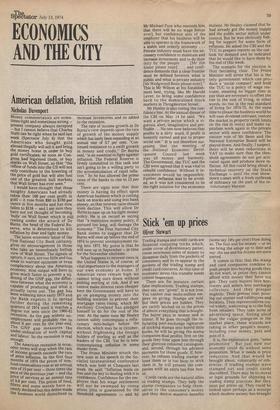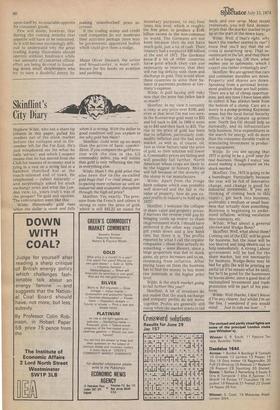Stick 'em up prices
Oliver Stewart
Trading stamps and credit cards are financial conjuring tricks which, under cover of diversionary patter, cause enormous sums of money to disappear daily from the pockets of consumers and to re-appear in the pockets of the trading stamp and credit card concerns. At this time of economic stress this transfer needs critical inspection.
There are, for instance, certain false implications. Trading stamps, they say, are "given". It is not true. You cannot rear multi-million empires on giving. Stamps are sold. But their prices are hidden. They are tacitly latched on to the prices of almost everything that is bought. The buyer pays in money and in labour. If he goes through the infuriating part-exchange rigmarole of sticking stamps into horrid little books, he will be giving the stamp companies dual profits; first on the goods they foist upon him through their glorious coloured catalogues, and, second, through his advance payments for those goods. If, however, he refuses trading stamps or loses them or is too busy to st.,ck them in, he will present the companies with an extra tax-free bonus.
Credit cards are the natural allies to trading stamps. They help the stamp companies to help themselves to the consumer's money and they derive massive benefits (some say 191/2 per cent) from doing so. The fool and his money — or let me bring the adage up to date and say: the ass and his Access are soon parted. It comes to this; that the stamp and card companies combine to push people into buying goods they do not want, at prices they cannot afford with money they have not got. They turn buyers into borrowers and sellers into surcharge collectors. And they prosper mightily. Their presses roar, pouring out stamps and catalogues and booklets. Their representatives travel widely, welcoming in to the fold fresh retailers. They take acres of advertising space. Sitting aloof from the vulgar goings-on in the market place, these wizards are raking in other people's money, including your money, pots and pots of it. It is, the explanation goes, "sales promotion". But just now our economy could do without sales promotion. What it needs is price reduction. And that would be brought about, voluntarily or otherwise, if trading stamps were stamped out and credit cards discredited. There may be no moral or legal grounds for objecting to trading stamp practices. But they must put prices up. They could be looked upon perhaps as a scourge which modern society has brought upon itself by its insatiable appetite for consumer goods.
Few will doubt, however, that during the coming months that appetite will have to be restrained. So it will become increasingly difficult to understand why the great trading stamp illusionists should operate without hindrance while vast amounts of concerted official effort are being devoted to hounding down small shopkeepers who try to earn a doubtful penny by
'making 'unauthorised' price increases.
If the trading stamp and credit card companies do not moderate their activities perhaps there may be government appointed bodies which could give them a nudge.
Major Oliver Stewart, the writer and broadcaster, is most wellknown for his books on aviation and yachting



































 Previous page
Previous page